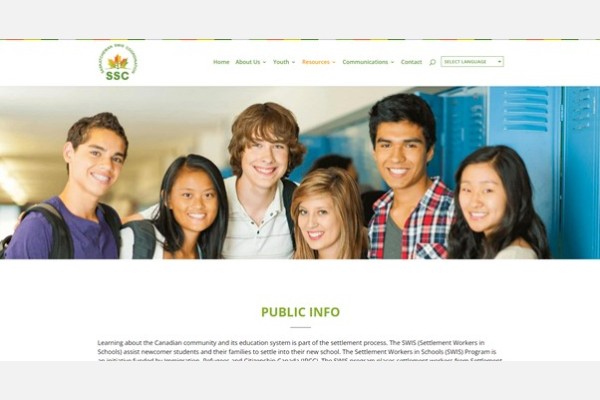Repository of Practices

Settlement Workers in Schools (SWIS-TÉÉ) - Updated in 2024
Dates
Type of practice
Summary
Canada’s Settlement Workers in Schools (SWIS) provides school-based settlement programming to support the integration of newcomer elementary and secondary students and their families while also fostering inclusion and intercultural competence within the education system. L’initiative des travailleurs et des travailleuses d’établissement dans les écoles (TÉÉ) is the equivalent of SWIS for French-speaking students and their families. TÉÉ services are offered in French and are adapted to the needs of French-speaking clients.
SWIS-TÉÉ workers are culturally-competent staff who act as cultural liaisons and system navigators between the school and newcomer students and their families. In general, SWIS-TÉÉ promotes student achievement by enabling youth to integrate more easily while supporting families and school staff.
Newcomers’ needs, including for language training, school registration and orientation, support services (i.e. translation, interpretation) and mental health support, are taken into account through SWIS-TÉÉ. Service Provider Organizations (SPOs) delivering SWIS-TÉÉ undertake assessments of needs and assets as part of their intake process to ensure that newcomer youth and their families receive adequate support in schools and through referral to other service providers.
There are approximately 3,000 locations across Canada offering SWIS-TÉÉ services. Given that SWIS-TÉÉ is a community-based initiative, some adaptations to the delivery of SWIS-TÉÉ services are necessary to respond to local and regional realities.
Organizations
Main Implementing Organization(s)
Detailed Information
Benefit and Impact
As an example of the initiative’s many direct impacts on newcomer youth: A young high school student, who arrived in Canada in 2016, was struggling because of mobility issues. The SWIS-TÉÉ worker at the high school helped the family access funding for a walker, wheelchair and physiotherapy. She also helped the mother communicate with the school so that they could work together to accommodate his needs.
SWIS-TÉÉ workers in some regions also coordinate school readiness programming to offer students a foundation for success before the academic year begins. Teachers, settlement workers and peer leaders (immigrant youth living in Canada for 2-3 years) work together to ensure a smooth entry to school by introducing new students to facilities, routines and policies, and by providing contacts and support.
The strength of SWIS-TÉÉ lies in its early interventions, which are essential for the successful integration of newcomer children into the education system. For example, primary and secondary schools are important to newcomer youth in Canada not only for their education but also for their settlement, social inclusion and belonging in their Canadian community and into Canadian society. Schools can act as gateways by offering timely access to direct (i.e. on-location) services and by providing referrals to other settlement provider organizations, which are dedicated to deliver Canadian government-funded settlement services to newcomers.
SWIS-TÉÉ is also a best practice in cooperation building, as groups that are not usually considered as part of the settlement experience for newcomers are able to benefit from SWIS-TÉÉ, such as school staff (e.g. teachers, administration). SWIS-TÉÉ workers help raise awareness of newcomer needs and promote inter-cultural understanding. SWIS-TÉÉ is a good example of how integrated approaches (i.e., incorporating schools, clients and settlement provider organizations) to service delivery are a central theme for successful settlement services.
Key Lessons
Newcomer clients (including students and their families) and school staff find SWIS-TÉÉ - services to be useful and responsive to their needs. SWIS-TÉÉ contributes to increased knowledge, involvement and performance in the education system by newcomer students. SWIS-TÉÉ is also useful for referring clients to other settlement services needed for immigrant success, and for enhancing cultural understanding on the part of school staff.
Recommendations(if the practice is to be replicated)
Innovation
- The impacts are sustainable as the initiative is well-established across local and regional education bodies and migrant and refugee service organizations.
Additional Resources
Media
SWIS Video Announcements - March 2023
Date submitted:
Disclaimer: The content of this practice reflects the views of the implementers and does not necessarily reflect the views of the United Nations, the United Nations Network on Migration, and its members.
More Related Practices:
- Comité de Cultura de Paz y Derechos Humanos
- Strengthening the capacities and frameworks to collect data and evidence on migration, the environment and climate change (MECC) in Mexico
- Encuesta Nacional Migrante de la Argentina (ENMA)
- A Gender-Focused Qualitative Study on Health Care-Seeking Behavior and Access to Tuberculosis Treatment among Mobile Populations from Moldova
- IOM’s Regional Programme Strengthens the Protection of Child Victims across North Africa and Key Routes
Peer Reviewer Feedback:
*References to Kosovo shall be understood to be in the context of United Nations Security Council resolution 1244 (1999).
Newsletter
Subscribe to our newsletter.